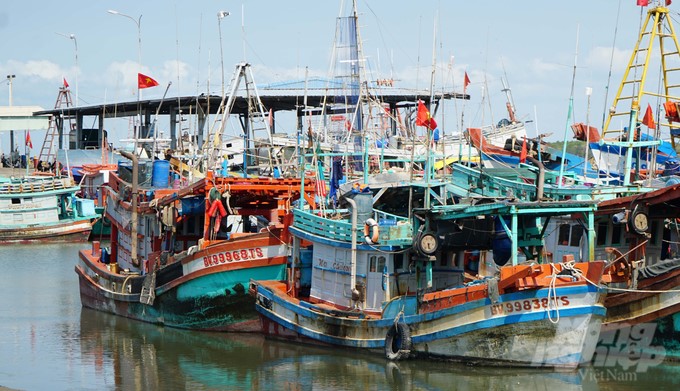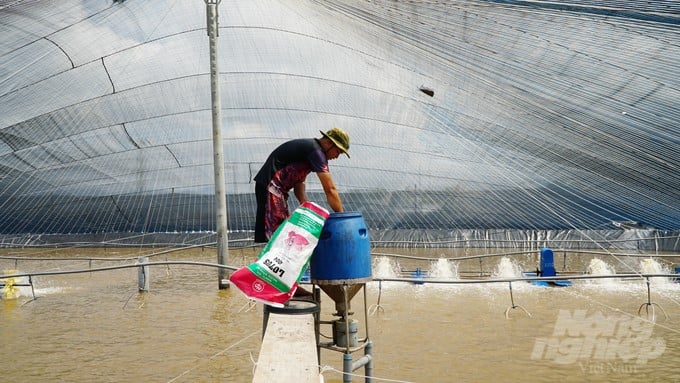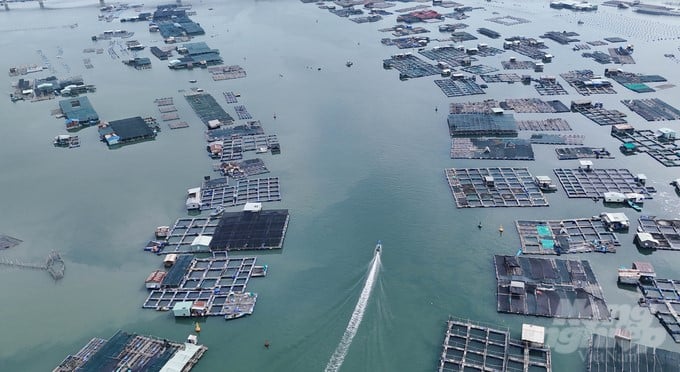June 15, 2025 | 20:48 GMT +7
June 15, 2025 | 20:48 GMT +7
Hotline: 0913.378.918
June 15, 2025 | 20:48 GMT +7
Hotline: 0913.378.918

Exploitation is always at a loss, so many ship owners have to "immobilize" their ships to avoid losses upon losses. Photo: Le Binh.
Currently, Ba Ria-Vung Tau province has a total of 4,345 fishing vessels, of which 2,623 operate in offshore areas, 610 vessels in nearshore areas, and 1,112 vessels in coastal areas. Recently, fishing output has been decreasing significantly. The reason is said to be that fishing areas are more limited and aquatic resources are exhausted.
It can be said that the IUU "yellow card" is an opportunity for coastal localities like Ba Ria-Vung Tau to reconsider their fisheries development direction. That is the clearest evidence of inharmonious development if only focusing on exploitation.
Mr. Huynh Son Thai, Director of the Ba Ria-Vung Tau Department of Agriculture and Rural Development, said that the province has implemented policy mechanisms to encourage investment in developing the offshore fishing fleet and implemented the structure and reorganization of fishing vessels in the direction of reducing the trawling profession according to planning.
"The agricultural sector has also proactively disseminated to raise awareness and responsibility for fishermen when fishing and following a sustainable direction. Fishermen are also trained, supported, and encouraged to change their fishing profession from drag nets to seine nets, and squid fishing, etc.," said Mr. Thai.
To ensure legally exploited seafood sources, dissemination work to raise awareness for fishermen in the fight against IUU fishing is focused on promoting by the entire political system of Ba Ria-Vung Tau province. Since 2022, no fishing vessel from the province has violated foreign waters. The rate of fishing vessels equipped with cruise monitoring equipment and recording fishing logs is over 97%.
Lieutenant Colonel Hoang Minh Duc, Chief of Ben Da Border Guard Station, said that fishermen are forced to comply with the orders of the Border Guard and Fisheries Surveillance forces regarding full paperwork, only fishing in their own waters, and complying with the State's regulations.
"In recent times, the unit has coordinated and well implemented the work of mobilizing the masses and controlling fishing vessels, so the awareness of fishermen when fishing at sea and not violating foreign waters has been improved significantly," said Lieutenant Colonel Hoang Minh Duc.
The Provincial Fisheries Association is proposing to apply a sea ban period for each area so that aquatic resources can be protected and promptly revived.
Mr. Nguyen Cong Vinh, Vice Chairman of the Ba Ria-Vung Tau Provincial People's Committee, said that the province is striving to become a national ocean economic center, and the fisheries industry plays an important role.
The province's goal is to restructure aquaculture and seafood exploitation, not setting a target of increasing output but mainly improving product quality. The province focuses on aquaculture, especially in the direction of organic farming, sustainable ecology, efficiency, and strong development of marine farming.

In recent years, Ba Ria-Vung Tau's fisheries industry has been focusing on aquaculture, especially the application of high technology. Photo: Le Binh.
Therefore, it can be said that Ba Ria-Vung Tau is "pivoting" to aquaculture, not only helping to rebalance the exploitation segment but also helping the industry develop more sustainably.
Mr. Nguyen Huu Thi, Deputy Director of the Provincial Department of Fisheries, said that Ba Ria-Vung Tau has an aquaculture area of more than 5,623.8 hectares, of which the majority is saltwater, brackish water farming, and in the form of advanced extensive farming.
"In recent years, the aquaculture industry has not only contributed to creating a stable supply of raw materials for seafood exports but also helped reduce pressure in offshore fishing," said Mr. Thi.
The province's agricultural sector also mobilizes and guides people to apply science and technology and use environmentally friendly materials in the production process, bringing high economic efficiency.

Cage fish farming area on the Cha Va river (Vung Tau city). Photo: Le Binh.
Currently, the whole province has 23 organizations and individuals raising and producing aquatic breeds using technology, with a total area of more than 429.31 hectares. The value ratio of high-tech farming products reached 46.54%, expected to increase sharply in the coming years.
Ba Ria-Vung Tau province's orientation to develop high-tech aquaculture will help people reduce risks when farming. Thus, profits will increase and productivity will be higher than traditional farming.
Translated by Thu Huyen
![Turning wind and rain into action: [4] Bringing climate bulletins to remote and isolated areas](https://t.ex-cdn.com/nongnghiepmoitruong.vn/608w/files/linhnhp/2025/06/14/1152-z6704423696987_15fd32ffc26d590d204d520c9dac6786-nongnghiep-151141.jpg)
(VAN) The Vietnam Agriculture and Nature Newspaper interviewed Mr. Vu Thai Truong, Acting Head of Climate Change and Environment at UNDP Vietnam, to gain deeper insight into how climate bulletins are delivered to farmers.

(VAN) In Tien Giang, a high-tech shrimp farm has developed a distinctive energy-saving farming model that has yielded promising results.
![Turning wind and rain into action: [3] 300.000 farmers benefit from agro-climatic bulletins](https://t.ex-cdn.com/nongnghiepmoitruong.vn/608w/files/news/2025/06/12/e5a48259d6a262fc3bb3-nongnghiep-125122.jpg)
(VAN) The agro-climatic bulletin has become a valuable tool for farmers in the Mekong Delta. After more than five years of implementation, the initiative is gradually being expanded nationwide.
![Turning wind and rain into action: [2] Providing forecasts to the people](https://t.ex-cdn.com/nongnghiepmoitruong.vn/608w/files/news/2025/06/12/e5a48259d6a262fc3bb3-nongnghiep-103927.jpg)
(VAN) In addition to improving the quality of hydrometeorological forecasts, putting forecast bulletins into practical use is crucial for production and disaster prevention.

(VAN) Blue carbon is receiving attention for its rapid absorption capacity and vast potential. It represents a promising nature-based solution to respond to climate change.
/2025/06/11/3507-1-161904_583.jpg)
(VAN) Seagrass beds and coral reefs serve as 'cradles' that nurture life in the ocean depths, creating rich aquatic resources in Vietnamese waters.
![Turning wind and rain into action: [1] Forecasting for farmers](https://t.ex-cdn.com/nongnghiepmoitruong.vn/608w/files/news/2025/06/11/e5a48259d6a262fc3bb3-nongnghiep-111919.jpg)
(VAN) Weather is no longer just a matter of fate. Forecasts have now become an essential companion for farmers in every crop season.